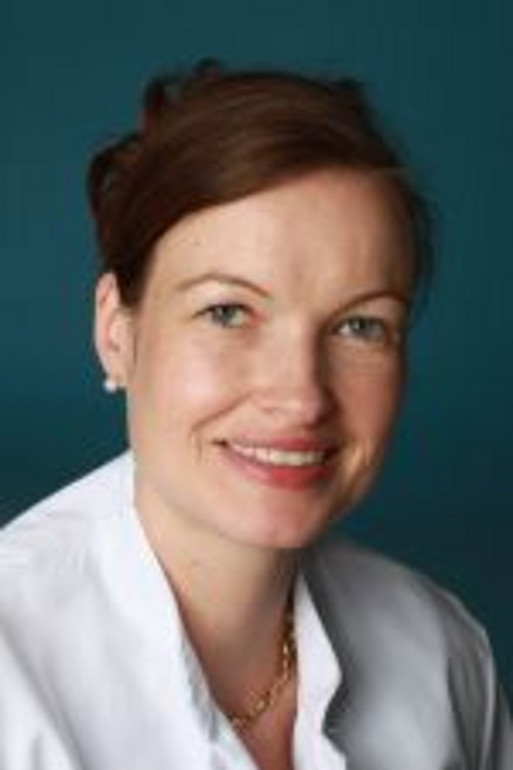Orbitazentrum der Universitätsmedizin Mainz

Leiterin der Orbitasprechstunde der Augenklinik: PD Dr. med. habil. Heike Elflein
Herzlich willkommen auf der Seite des Orbitazentrums Mainz!
(scroll down for information in english)Die Universitätsmedizin bietet Patienten mit Orbitaerkrankungen und speziell endokriner Orbitopathie (EO) eine Versorgung innerhalb eines interdisziplinären Orbitazentrums. Neben einem spezialisierten Team der Augenklinik (PD Dr. med. habil. Heike Elflein und Dr. med. Lea Grauhan, FEBO) ist die I. Medizinische Klinik (Prof. Dr. G. J. Kahaly, Schwerpunkt für Endokrinologie und Stoffwechselerkrankungen) Ansprechpartner für Patienten mit dieser Erkrankungen. Eine enge Kooperation besteht weiterhin mit dem Institut für Neuroradiologie (Prof. Dr. M. Brockmann), den Kliniken für Mund-, Kiefer- und Gesichtschirurgie (Prof. Dr. Dr. W. Wagner, Prof. Dr. Dr. B. Al-Nawas), für Strahlentherapie (Prof. Dr. H. Schmidberger) für Hals- Nasen- und Ohrenheilkunde (Prof. Dr. C. Matthias) und für Neurochirurgie (Prof. Dr. F. Ringel).
Das Orbitazentrum bietet ein umfassendes diagnostisches und therapeutisches Spektrum. Die Entscheidung, welche Therapie für den jeweiligen Patienten/ die jeweilige Patientin die individuell richtige ist, treffen wir im Team. Das heißt, Experten der jeweiligen Fachrichtungen entscheiden gemeinsam mit dem Patienten/ der Patientin, welche Therapie am ehesten geeignet ist. Bei Tumorerkrankungen erfolgt die interdisziplinäre Beratung im Rahmen des Tumorboards (UCT), über die auch Nachbardisziplinen wie die Dermatologie und die Onkologie in die Betreuung eingebunden sind.
Schwerpunkte der Augenklinik sind:
- Anpassung von Prismen zum Ausgleich von Doppelbildern
- Auswahl geeigneter Lokaltherapie
- Beratung und Koordination von Diagnostik und Therapie bei den verschiedenen Kooperationspartnern
- Korrektur von Lidfehlstellungen
- Schieloperation bei Motilitätsstörungen und Doppelbildern
- Dekompressionsoperation bei hervorstehenden Augen, schwerer Hornhautschädigung und Schädigung des Sehnervs bei EO
- Tumorchirurgie intraorbitaler Prozesse (je nach Lokalisation interdisziplinäre Therapie)
Es besteht eine wöchentliche interdisziplinäre Orbitasprechstunde (dienstags, Terminvereinbarung unter 06131/ 17-5150).
-------------------------------------------------------------------
Center for Orbital Disorders of Mainz University Clinic
Head of the specialized clinic for orbital disorders: Dr. med. Heike Elflein
Welcome to the Mainz Center for Orbital Disorders‘ Webpage!
The Mainz University Clinic offers patients with disorders of the orbit, especially thyroid associated orbitopathy (TAO), treatment within an interdisciplinary Center for Orbital Disorders. Besides the Eye Clinic’s specialized team (led by PD Dr. med. habil. H. Elflein and Dr. med. Lea Grauhan, FEBO), the Department of Internal Medicine (I. Medizinische Klinik) represented by Prof. Dr. G. J. Kahaly (Center for Endocrinology and Metabolic Disorders) provides support and guidance for patients with these disorders. The two teams from the Departments of Ophthalmology Medicine I. cooperate closely with the Departments of Neuroradiology (Prof. Dr. M. Brockmann), Oral and Maxillofacial Surgery (Prof. Dr. Dr. B. Al-Nawas and Prof. Dr. Dr. W. Wagner), Radiation Therapy (Prof. Dr. H. Schmidberger), Otorhinolaryngology (Prof. Dr. med. Christoph Matthias), and Neurosurgery (Prof. Dr. F. Ringel).
One example of a successful multidisciplinary cooperation (besides that with endocrinology) was the invention of a novel tool for bony decompression surgery: the piezosurgical device. Being well-established in maxillofacial surgery, the cooperation with Prof. Dr. Dr. B. Al-Nawas led to the first structured study on this tool for bony decompression surgery in TAO. Meanwhile, the piezo-saw is used in all decompression surgeries performed at the specialized orbital clinic.
The Center for Orbital Disorders offers a comprehensive diagnostic and therapeutic spectrum. The decision about the particular therapy that is best for each individual patient is made by the entire team. In other words, the experts from the various disciplines consult and decide together with the patient, which therapy is most suitable. In the case of orbital tumors, the interdisciplinary consultation takes place in a so-called tumor board, which may also involve specialists from the departments of Dermatology and Oncology, who contribute additional medical insight.
- providing prisms for eyeglasses to correct for double vision
- selecting an appropriate local therapy
- coordinating, and advising on, diagnostic measures and therapy among the various clinical partners
Surgical therapy:
- correcting malpositioned eyelids
- strabismus surgery in cases of motility defects and double vision
- decompression surgery in cases of protruding eyeballs, severe corneal impairment, and Graves’ Orbitopathy-related damage to the optic nerve
- intraorbital tumor surgery (in conjunction with additional interdisciplinary therapies depending on tumor entity and localization)
The Center for Orbital Disorders offers weekly interdisciplinary office hours every Tuesday. For appointments call +49 – 613117 – 5150.